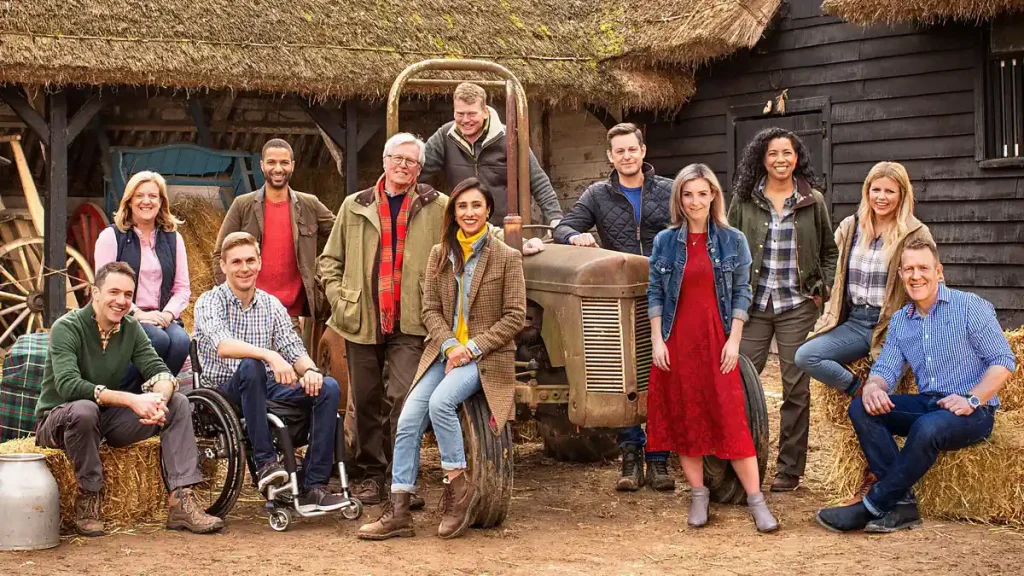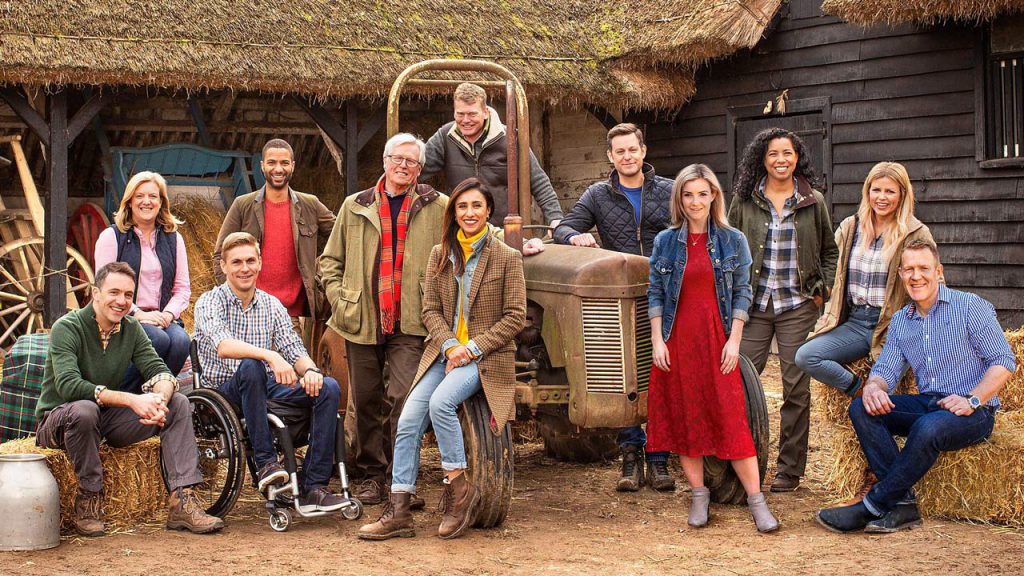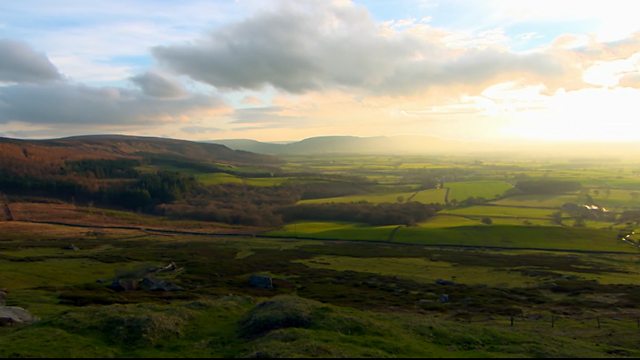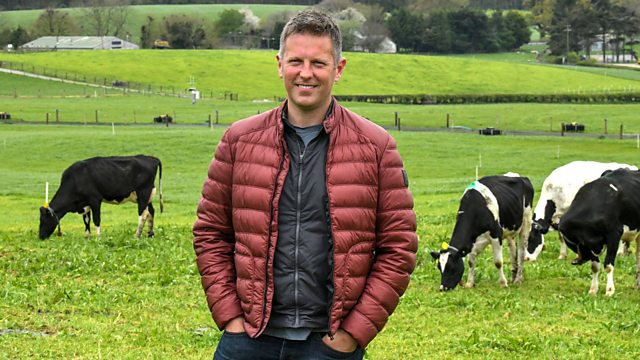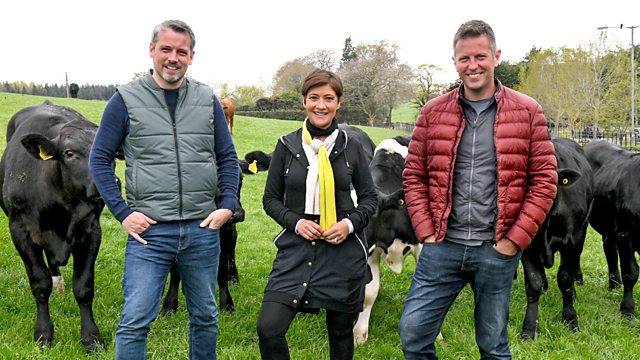Countryfile – Dumfries House – Countryfile makes a captivating return to Dumfries House this autumn, marking the first teaching year at the newly launched rural skills centre, a project recently opened by the King. The show’s hosts, Margherita Taylor and Joe Crowley, delve into how this innovative centre is poised to revolutionize agricultural education for future generations of farmers and significantly benefit the wider countryside. Their journey also focuses on bridging the gap between people and the land.
Margherita joins a group of eager schoolchildren in experiencing the centre’s state-of-the-art facilities firsthand. She immerses herself in an interactive session with a cutting-edge educational tool, the calving simulator, providing a unique, hands-on learning experience. Additionally, Margherita contributes to the estate’s upkeep by pruning some of the thousands of roses in its extensive collection, a task highlighting the importance of horticulture in rural education.
Joe Crowley takes on significant responsibilities with the Dumfries House cleaning crew, tackling the meticulous job of dusting a priceless chandelier, a testament to the estate’s rich history and cultural heritage. Embracing local traditions, Joe also engages with one of Scotland’s most renowned cultural symbols, the bagpipes, offering viewers a glimpse into the country’s musical heritage.
In a parallel narrative, Tom Heap investigates the pressing issues faced by rural families in securing additional educational support for their children, a critical aspect of rural life often overlooked. Simultaneously, Adam Henson is absorbed in a fascinating new research project. This project is at the forefront of developing advanced technology aimed at enhancing our understanding of beekeeping and honey production, exploring the intricate and often underappreciated science behind this sweet, natural product.
Dumfries House: A Beacon for Agricultural Learning and Rural Skills
The Inauguration of the Rural Skills Centre
Dumfries House, a gem nestled in the heart of the countryside, embarks on a new chapter as autumn adorns its landscapes. Recently, the estate has been in the spotlight for its newly opened rural skills centre, an initiative endorsed by the King. This centre marks a significant milestone in the estate’s history, representing a fusion of tradition and innovation in agricultural learning. The rural skills centre has been designed from the ground up to provide comprehensive and immersive education in all aspects of agriculture and land management. With state-of-the-art facilities equipped for both classroom learning and practical application, students can develop well-rounded expertise spanning topics like livestock rearing, horticulture, machinery operation, and more. Its inauguration also complements Dumfries House’s existing dedication to preserving traditional crafts and serving the local community. Moving forward, the centre is poised to produce highly skilled, ethical, and environmentally conscious farmers and stewards of the land.
Role in Educating Future Farmers
The rural skills centre at Dumfries House stands as a testament to the estate’s commitment to nurturing the next generation of farmers. With a curriculum designed to marry theoretical knowledge with practical skills, it aims to equip students with a comprehensive understanding of modern agricultural practices while paying homage to traditional farming techniques. The programmes offered emphasise not just profitability and productivity, but also environmental sustainability, animal welfare, and community development. Learners can pursue vocational courses, apprenticeships, and university-level qualifications tailored to their specialisations and interests within the agricultural sector. The teaching faculty themselves bring a wealth of real-world experience managing the estate’s operations. With mentorship from these experts, students gain exposure to everything from maintaining heritage breed livestock to operating high-tech greenhouse control systems using renewable energy sources. The centre’s multifaceted initiatives to train farmers of the future are vital to securing food security while also preserving rural heritage.
Bridging the Gap Between People and the Land
Hands-On Learning Experiences
Margherita Taylor and Joe Crowley, in their visit documented by BBC One’s Countryfile, highlighted the centre’s emphasis on experiential learning. Students and visitors, including schoolchildren, have the opportunity to engage directly with the land and its resources. Notable among these experiences is the innovative calving simulator, a tool that provides a realistic insight into livestock management, an essential skill in rural livelihoods. The calving simulator comprises a life-like model cow and calf designed to mimic the stages of calving accurately. Learners assume the role of a farmer aiding the birthing process, gaining first-hand experience of key interventions like repositioning calves, using obstetric chains, and determining when veterinary assistance is necessary. Such immersive learning builds confidence in handling livestock emergencies independently in real farm settings. Beyond calving simulations, the centre also actively maintains paddocks of heritage breed cattle like Galloways and Highland coos. Students can be hands-on with tasks like herding, feeding, housing, and monitoring the health of these animals. These invaluable experiences enable graduates passionate about livestock farming to hit the ground running as the next generation of beef and dairy professionals.
Horticulture and Estate Upkeep – Countryfile – Dumfries House
In addition to livestock management, the centre also focuses on horticulture. Margherita’s involvement in pruning the estate’s extensive rose collection underlines the importance of plant cultivation in agricultural education. Such activities not only teach vital gardening skills but also foster a deeper appreciation for the estate’s natural beauty and biodiversity. The grounds of Dumfries House encompass not just picturesque gardens, but also productive fruit orchards, vegetable patches, and 1750 acres of organic farmland. Aspiring growers who study at the estate’s rural skills centre can learn by actively contributing to the upkeep of these living classrooms. Tasks might range from sowing and harvesting produce to planting hedgerows and woodland groves for habitat restoration. Whether producing artisanal jams and ciders or maintaining scenic wilderness for community recreation, learners experience the entire process from soil to sale or conservation outcome. These holistic experiences give graduates the expertise to pursue diverse horticulture careers – from groundskeeping roles to independent nursery or urban microfarm ownership.
Integrating Tradition with Modern Learning
The Importance of Cultural Heritage
Joe Crowley’s experience with dusting a priceless chandelier and playing the bagpipes resonates with the estate’s aim to blend cultural heritage with contemporary education. These activities underscore the importance of preserving traditional skills and crafts, which are integral to understanding Scotland’s rich rural history. While agriculture relies on science and technology now more than ever, upholding traditions remains vital to delivering sustainability, community cohesion, and a deeply fulfilling farmer experience. That’s why Dumfries House integrates heritage crafts like stonemasonry, textiles, music and more into the rural skills centre curriculum. Learners might gain traditional joinery insights by hand-carving gates or fencing for the estate’s livestock paddocks. Or they could use heritage breed fleeces from sheep reared on-site to practice spinning and weaving textiles. There’s even a fully kitted-out smithy to teach metalworking skills that have been passed down generations. Weaving these crafts into the learning journey resonates with students seeking to honour regional identities and time-tested techniques even as agriculture progresses. Graduates emerge well-equipped to infuse contemporary farming with elements of culture, from artisanal regional produce to architecturally significant farm buildings.
Technology in Agriculture
Adam Henson’s exploration of a new research project focused on honey production technology signifies the estate’s forward-thinking approach. This project, aimed at understanding the science behind beekeeping, demonstrates the centre’s dedication to integrating cutting-edge technology with agricultural studies. Agriculture today relies extensively on innovations like AI, robots, genomics and precision farming to raise productivity and efficiency. Rather than resisting the future, Dumfries House proactively embraces emerging technologies so that their impact can be shaped positively. The rural skills centre is equipped with sites dedicated to researching high-tech solutions tailored for sustainable Scottish agriculture and the surrounding region’s needs. Remote sensor networks, hydroponics, and data analytics dashboards give learners vital experience leveraging these tools for tasks like predictive modelling of crop disease outbreaks. Not only does proficiency with new innovations maximise employment opportunities for graduates, but it can also minimise farming’s environmental footprint. The future farmers trained here will lead the agritech revolution toward goals like minimal waste production, net-zero carbon emissions, and meaningfully enhancing biodiversity.
Addressing Challenges in Rural Education
Investigating Educational Support in Rural Areas
Tom Heap’s investigation into the challenges faced by families in obtaining additional educational support for their children in rural schools sheds light on the broader issues within rural education systems. This inquiry is crucial in identifying gaps and formulating strategies to enhance educational resources in rural settings. Remote learning during the pandemic has highlighted disparities in rural education access, from minimal broadband connectivity to lack of supplementary tuition options compared to cities. Rural skills education for young learners is pivotal to inspiring talented youth to sustain local agricultural economies. Dumfries House’s programmes aim to support local authority schools in enriching curriculum offerings related to the land and environment. Collaboration with regional schools and education non-profits can enhance the quality of rural education across a range of disciplines like STEM, arts, and agriculture. New models that mutually support academic outcomes and the preservation of working lands should be investigated, including land-based apprenticeships, demonstration school farms, and subsidised field trip opportunities. Rethinking rural learning infrastructure promises to unlock innovation, retain intellectual capital, and sustain vibrant rural communities far into the future.
Frequently Asked Questions: Countryfile – Dumfries House
What is the significance of Dumfries House’s rural skills centre?
The rural skills centre at Dumfries House is pivotal in advancing agricultural education, combining traditional farming methods with modern technology, and promoting hands-on learning experiences.
How does Dumfries House contribute to bridging the urban-rural divide?
Through educational initiatives and experiential learning opportunities, Dumfries House plays a key role in reconnecting people with the land and raising awareness about the importance of agriculture in contemporary society.
What unique experiences does Dumfries House offer to visitors and students?
The estate offers a range of activities, from practical sessions with a calving simulator to horticulture and the preservation of cultural heritage, like playing traditional instruments and maintaining historical artifacts.
